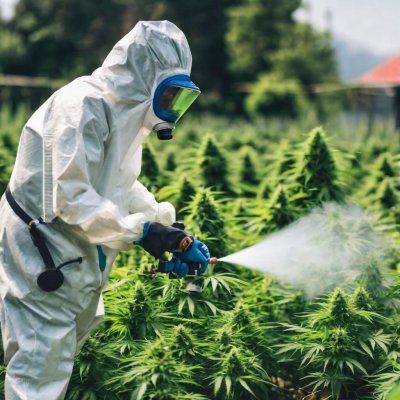As journalists, we often find ourselves delving into unsightly truths. In the realm of legal cannabis, a myriad of concerns shadows the otherwise promising landscape of commercial cultivation. Over 350 pesticides, identified by the National Library of Medicine, are applicable to cannabis cultivation. Many of these substances are sanctioned for usage in fruits and vegetables, but the knowledge gap is gaping when it comes to their effects upon combustion and inhalation.
In 2019, a study by the National Center for Biotechnology Information highlighted a disconcerting fact: "There is a complete lack of research on the toxicity of pyrolyzed pesticides in humans from smoking cannabis." This industry is advocating for cannabis to be recognized as a medicinal product, yet the research on inhaled pesticides is completely absent. Policymakers from California to Maryland are constructing regulations with far-reaching implications for the public, raising an urgent question: What pesticides, if any, are safe to use in a product intended for smoking?
In an interview with Cannabis & Tech Today, Kim Stuck, founder and CEO of Allay Consulting and a former Colorado cannabis regulator, reflected on her regulatory experience. She confessed that during the formulation of Colorado's earliest regulations for adult-use cannabis, certain aspects were neglected. "We hadn't considered pesticides as contaminants at the beginning," Stuck admitted. As a result, they had to revise these regulations to guarantee product safety.
The absence of federal oversight in the cannabis sector has led to each state formulating its own guidelines, creating a patchwork of regulations. While some states are focusing on generating revenue through industry taxation, others are neglecting to implement effective health and safety regulations. Stuck expressed her concern over this issue, stating, "There are numerous states that are not giving due importance to public health in relation to cannabis".
States with legalized cannabis are grappling with similar issues of pesticide contamination. In 2023, Washington, Vermont, and Nevada issued product recall notices to manufacturers. In Washington, officials detected DDE, a chemical remnant of the carcinogenic pesticide DDT, in samples from grows along a five-mile stretch of the Okanogan River.
This pesticide is not on the list of 59 banned substances by the Washington State Liquor and Cannabis Board, primarily because it's not directly applied to the crops. Instead, it was absorbed from the soil by the cannabis plants, nature's potent soil cleaners. This area along the Okanogan River was once occupied by apple orchards that were treated with DDT four decades ago. Although the farmlands appeared healthy, a chemical analysis revealed a different story.
Whether it's unknown pollutants or commonly used agricultural pesticides that are not approved for cannabis, contaminated products are emerging nationwide. In Vermont, a batch of flower was recalled after a consumer reported experiencing headaches and nausea. Lab results confirmed the presence of Eagle 20, a pesticide approved for many fruits and vegetables but not for cannabis.
The human body responds differently to inhaled pesticides compared to ingested ones. Michelle Perro, a former pediatrician and co-founder of the non-profit GMO Science, informed BBC News that initial symptoms of pesticide exposure can include headaches, nausea, dizziness, and respiratory secretion. She added, "Inhaling pesticides through our lungs can be more toxic because our gut contains microbes that help detoxify pollutants".
Fungicides can also undergo alterations when subjected to combustion and inhalation. Myclobutanil, a widely used fungicide, transforms into hydrogen cyanide upon heating, a lethal gas infamously used during the Holocaust. A number of states are now banning its use on cannabis. Sulfur, a common treatment for powdery mildew, is not recommended for cannabis treatment, although few states prohibit its use. When heated, sulfur turns into sulfur dioxide, a colorless gas that reacts with the moisture in mucous membranes to form sulfurous acid, a potent irritant according to the Agency for Toxic Substances and Disease Registry.
In New Mexico, there is no requirement for testing sulfur presence in cannabis. However, Mountaintop Extracts, a cannabis concentrate company based in Albuquerque, NM, has established a sulfur-testing procedure derived from a standard used in the Northern California wine industry. Owners Jen and Eric Merryman discovered that some of the flowers they received for processing into concentrates contained sulfur. Thanks to their testing procedures, they return any product tainted with the substance. Unfortunately, many operators in the state are unaware of sulfur contamination being an issue.
Shanduke McPhatter, founder and executive director of the non-profit Gangstas Making Astronomical Community Changes, warned about the hazards of unlicensed dispensaries. McPhatter shared a personal story of a young man he knew who smoked tainted cannabis from a dubious dealer, resulting in a permanent personality change. He emphasized the need to address illegal dispensaries, stating, "These illicit stores must be dealt with".
The situation is not entirely bleak. Regulators in every state where adult-use is legal are catching safety issues, identifying new contaminants to test for, and recalling tainted products. The system is functioning. Regulated cannabis is safer than its unregulated counterpart, and it's continually improving.
Many states are beginning to require Good Manufacturing Practice (GMP) certification, a set of regulations established by the U.S. Food and Drug Administration that mandates a quality approach to manufacturing. This consumer protection measure addresses record keeping, personnel qualifications, sanitation, cleanliness, and a host of other issues that can impact consumer health and safety.
Stuck shared that her company often receives requests for assistance with GMP compliance. She noted, "It is definitely a barrier to entry and I don’t love that. But at the same time, I guarantee that New York’s cannabis products are going to be very safe because of this".
Improved safety standards and strict testing requirements are enhancing the industry's public health outcomes. Business owners who genuinely care about their customers also contribute to the safety and quality of products available. Knowledge is power. The more informed every customer and operator becomes, the safer this space will be. Stuck echoed this sentiment, stating, "These companies are not being malicious, they’re not trying to do the wrong thing. They just don’t know what they’re supposed to be doing because nobody is telling them what they’re supposed to be doing".
In 2019, a study by the National Center for Biotechnology Information highlighted a disconcerting fact: "There is a complete lack of research on the toxicity of pyrolyzed pesticides in humans from smoking cannabis." This industry is advocating for cannabis to be recognized as a medicinal product, yet the research on inhaled pesticides is completely absent. Policymakers from California to Maryland are constructing regulations with far-reaching implications for the public, raising an urgent question: What pesticides, if any, are safe to use in a product intended for smoking?
In an interview with Cannabis & Tech Today, Kim Stuck, founder and CEO of Allay Consulting and a former Colorado cannabis regulator, reflected on her regulatory experience. She confessed that during the formulation of Colorado's earliest regulations for adult-use cannabis, certain aspects were neglected. "We hadn't considered pesticides as contaminants at the beginning," Stuck admitted. As a result, they had to revise these regulations to guarantee product safety.
The absence of federal oversight in the cannabis sector has led to each state formulating its own guidelines, creating a patchwork of regulations. While some states are focusing on generating revenue through industry taxation, others are neglecting to implement effective health and safety regulations. Stuck expressed her concern over this issue, stating, "There are numerous states that are not giving due importance to public health in relation to cannabis".
States with legalized cannabis are grappling with similar issues of pesticide contamination. In 2023, Washington, Vermont, and Nevada issued product recall notices to manufacturers. In Washington, officials detected DDE, a chemical remnant of the carcinogenic pesticide DDT, in samples from grows along a five-mile stretch of the Okanogan River.
This pesticide is not on the list of 59 banned substances by the Washington State Liquor and Cannabis Board, primarily because it's not directly applied to the crops. Instead, it was absorbed from the soil by the cannabis plants, nature's potent soil cleaners. This area along the Okanogan River was once occupied by apple orchards that were treated with DDT four decades ago. Although the farmlands appeared healthy, a chemical analysis revealed a different story.
Whether it's unknown pollutants or commonly used agricultural pesticides that are not approved for cannabis, contaminated products are emerging nationwide. In Vermont, a batch of flower was recalled after a consumer reported experiencing headaches and nausea. Lab results confirmed the presence of Eagle 20, a pesticide approved for many fruits and vegetables but not for cannabis.
The human body responds differently to inhaled pesticides compared to ingested ones. Michelle Perro, a former pediatrician and co-founder of the non-profit GMO Science, informed BBC News that initial symptoms of pesticide exposure can include headaches, nausea, dizziness, and respiratory secretion. She added, "Inhaling pesticides through our lungs can be more toxic because our gut contains microbes that help detoxify pollutants".
Fungicides can also undergo alterations when subjected to combustion and inhalation. Myclobutanil, a widely used fungicide, transforms into hydrogen cyanide upon heating, a lethal gas infamously used during the Holocaust. A number of states are now banning its use on cannabis. Sulfur, a common treatment for powdery mildew, is not recommended for cannabis treatment, although few states prohibit its use. When heated, sulfur turns into sulfur dioxide, a colorless gas that reacts with the moisture in mucous membranes to form sulfurous acid, a potent irritant according to the Agency for Toxic Substances and Disease Registry.
In New Mexico, there is no requirement for testing sulfur presence in cannabis. However, Mountaintop Extracts, a cannabis concentrate company based in Albuquerque, NM, has established a sulfur-testing procedure derived from a standard used in the Northern California wine industry. Owners Jen and Eric Merryman discovered that some of the flowers they received for processing into concentrates contained sulfur. Thanks to their testing procedures, they return any product tainted with the substance. Unfortunately, many operators in the state are unaware of sulfur contamination being an issue.
Shanduke McPhatter, founder and executive director of the non-profit Gangstas Making Astronomical Community Changes, warned about the hazards of unlicensed dispensaries. McPhatter shared a personal story of a young man he knew who smoked tainted cannabis from a dubious dealer, resulting in a permanent personality change. He emphasized the need to address illegal dispensaries, stating, "These illicit stores must be dealt with".
The situation is not entirely bleak. Regulators in every state where adult-use is legal are catching safety issues, identifying new contaminants to test for, and recalling tainted products. The system is functioning. Regulated cannabis is safer than its unregulated counterpart, and it's continually improving.
Many states are beginning to require Good Manufacturing Practice (GMP) certification, a set of regulations established by the U.S. Food and Drug Administration that mandates a quality approach to manufacturing. This consumer protection measure addresses record keeping, personnel qualifications, sanitation, cleanliness, and a host of other issues that can impact consumer health and safety.
Stuck shared that her company often receives requests for assistance with GMP compliance. She noted, "It is definitely a barrier to entry and I don’t love that. But at the same time, I guarantee that New York’s cannabis products are going to be very safe because of this".
Improved safety standards and strict testing requirements are enhancing the industry's public health outcomes. Business owners who genuinely care about their customers also contribute to the safety and quality of products available. Knowledge is power. The more informed every customer and operator becomes, the safer this space will be. Stuck echoed this sentiment, stating, "These companies are not being malicious, they’re not trying to do the wrong thing. They just don’t know what they’re supposed to be doing because nobody is telling them what they’re supposed to be doing".




